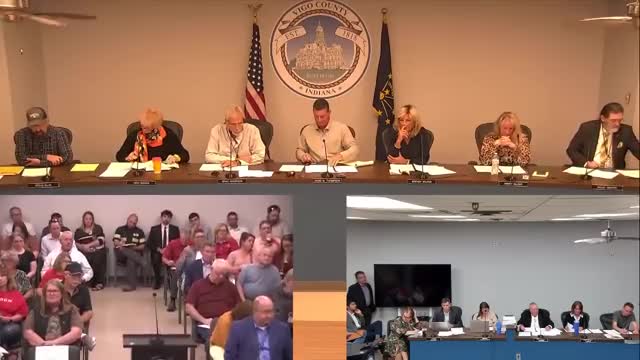Vigo County council adopts ordinance requiring voter referendum before county funds used for school buildings
Get AI-powered insights, summaries, and transcripts
Subscribe
Summary
After heated debate and public comment, the Vigo County Council approved an ordinance that bars use of county funds for acquiring land, building, or renovating school facilities for the Vigo County School Corporation without a ballot referendum; the measure passed 4-3.
The Vigo County Council on Oct. 14 adopted an ordinance that requires a countywide referendum before the council may appropriate any taxpayer funds for acquiring land, constructing or renovating school buildings, or funding an oversight board for the Vigo County School Corporation. The measure passed on a 4-3 roll-call vote.
Supporters said the ordinance returns final authority on large capital spending for schools to voters. Councilman Steve Ellis, who introduced the measure, read the text into the record, saying, “Unless specifically mandated by Indiana law ... the Vigo County Council will not appropriate any taxpayer monies, funds or other county financial resources ... without a ballot referendum requesting said specific funding and a specific ... approval by the registered voters of Vigo County.”
Proponents framed the ordinance as a protection against large, long-term county commitments without direct voter approval. “This ordinance does not stop this Council from funding any school project,” Councilman Randy Gentry said during debate, adding the measure “returns the power to the people” and lets voters decide whether to invest in multi‑million‑dollar projects.
Opponents raised legal and procedural concerns and argued the council needed more time and information before taking the step. County legal counsel Michael Wright advised the body that the council’s procedural rules and customary notice practices weigh against immediate consideration. Wright told the council the auditor’s office first saw the ordinance only the prior week and said that, in his view, the short notice made consideration tonight inappropriate.
Council President Thompson initially ruled the matter not in proper order for a vote at the meeting; Council members then appealed the president’s ruling and overruled it, allowing debate and the roll-call vote. The final roll call on the ordinance was: Randy Gentry, Nancy Alsop, Steve Ellis and Vicky Wager — yes; Brenda Wilson, Brad Anderson and David Thompson — no.
The council’s action prompted a lengthy public comment period during which business, education and neighborhood leaders urged different approaches. Several speakers said they supported an oversight committee and a careful, transparent review process but disagreed about whether the county should commit funds upfront. Teachers, parents and other residents told the council they worry about aging school facilities and student outcomes; union and community leaders urged more cooperation among the county, city and school board to secure funding and foundation support.
The ordinance text, as read into the record, lists five explicit prohibitions on county appropriations for school-related land acquisition, construction, renovations, and for creation or funding of boards or commissions intended to oversee school facility projects without voter approval, except where state law requires otherwise.
What happened next: the council did not repeal or block formation of any oversight committee in statute; the vote restricts county appropriations for the uses listed in the ordinance unless and until a referendum authorizes them. Several council members and the mayor said they remain open to discussing voluntary partnerships, private funding and grant-seeking, and the commissioners retain authority granted by state law to take certain actions regarding an oversight commission.
The council did not specify an implementation timetable in the ordinance. Council members who opposed the measure said they hope to continue discussions about alternative funding and oversight arrangements and said the matter could be revisited if the council’s position changes or new information emerges.
